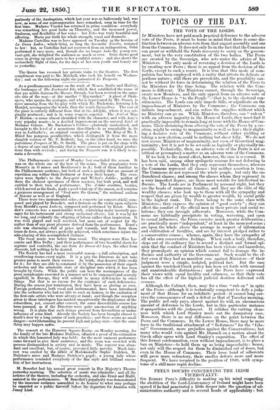The Philharmonic concert of Monday last concluded the season. It
was on the whole one of the best of the series. The symphonies were Mozart's in G minor and Beethoven's in A; both of them familiar to the Philharmonic audience, but both of such a' quality that no amount of repetition can wither their freshness or lesson their beauty. The over- tures were Spohr's to the Berg-grist and Weber's Jubilee; neither of them the choicest specimens of these masters, but both good, and well entitled to their turn of performance. The Jubilee overture, besides, which served as the finale, made a good wind: up of the season, as it contains a gorgeous arrangement of "God save the Queen," the national anthem of Saxony as well as of England. There were two instrumental solos; a concerto (or concert-stuck) com- posed and played by Benedict, and a fantasia on the violin upon subjects from Hernld's opera Ludorie, composed and performed by Ernst. Bene- dict's concerto was a musidanhice work, containing many masterly pas- sages for his instrument and strong orchestral effects ; but it was by far too long, and evidently the offspring of labour rather than inspiration. It was well played and well received, but more out of respect for the author than of any great pleasure derived fxoni the performance. Ernst's solo was charming—full of grace and warmth, and free from those tours de force, not always perfectly achieved, which sometimes injure the solo-playing of this accomplished violinist. The vocal music was better than usual. The singers were Miss Lu- combo and Miss Dolby ; and their performance of two beautiful duets for soprano and contralto, the one from La Donna del Lap, the other from Jessonda, left nothing to be desired. The Society has had a most successful season—a full subscription, and overflowing rooms every night It is a pity the Directors do not take to merit their success. In truth, they deserve little credit are able to command it by the possession of their superb greater ateit ;r pains
orchestra and the admirable state of discipline into which it has been brought by Costa. While the public can hear the masterpieces of the great symphonists executed in a manner not to be surpassed (and scarcely evened) in Europe, they will submit to many deficiencies in other things. But that is no excuse for the existence of such deficiencies. During the season just terminated, they have been as glaring as ever. IrOreign performers, both vocal and instrumental, have been introduced into the orchestra who had no title to such an honour, to the exclusion of the first-rate artists who were always at hand; and though the reception given to these interlopers has marked unequivocally the displeasure of the subscribers, yet, concert after concert, the same discreditable course has been pursued, as if the Directors were quite unconscious of anything wrong. It is plain that such doings proceed from favouritism or undue influence of some kind. Already the Society has been brought almost to deatlea door by a long course of such practices; and there seems no small danger—notwithstanding its present high and panty state—that the same thing may happen again.


























 Previous page
Previous page